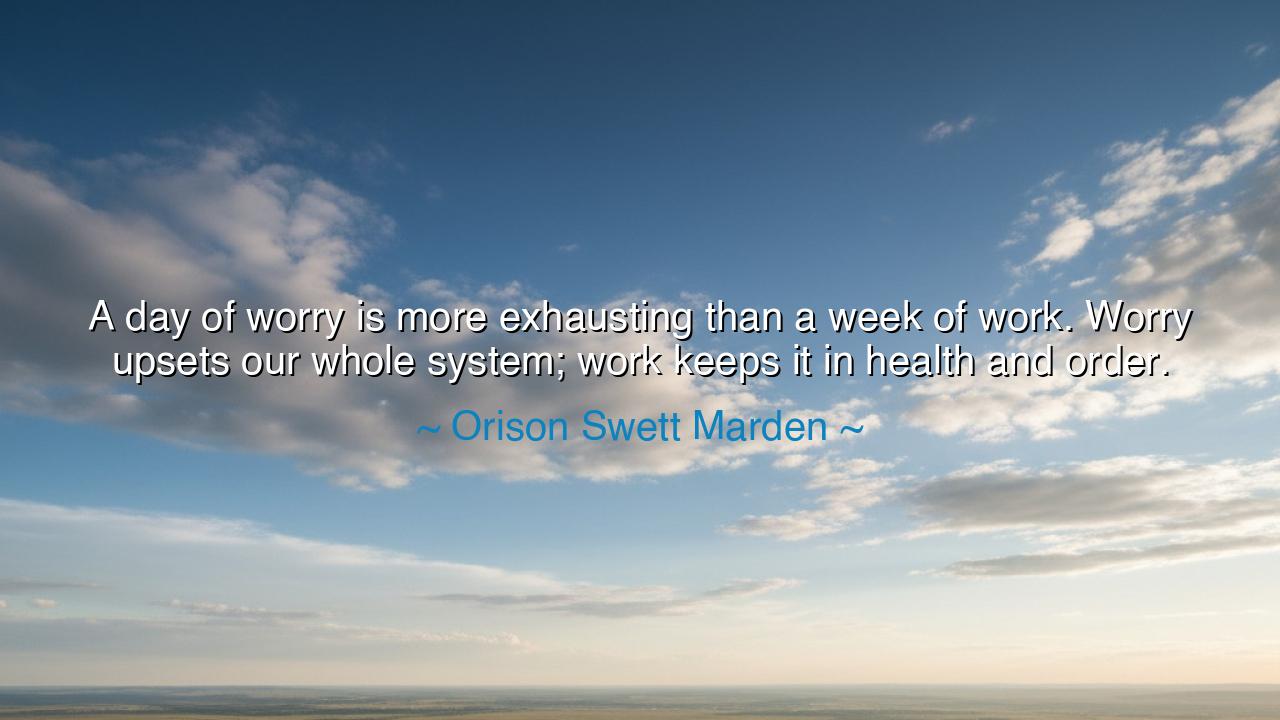
A day of worry is more exhausting than a week of work. Worry
A day of worry is more exhausting than a week of work. Worry upsets our whole system; work keeps it in health and order.






In the timeless and restorative words of Orison Swett Marden, a pioneer of self-reliance and the founder of Success Magazine, there resounds a truth as vital today as it was a century ago: “A day of worry is more exhausting than a week of work. Worry upsets our whole system; work keeps it in health and order.” In this simple yet profound saying, Marden offers not just advice, but a philosophy of life — one born from observation, struggle, and faith in the human spirit. He speaks of the invisible drain that worry imposes upon body and soul, and the healing order that work, when pursued with purpose, brings to the restless heart. His words remind us that toil, far from being a curse, is a medicine for the mind — that action, not anxiety, is the antidote to despair.
The origin of this quote lies in Marden’s own journey through hardship and renewal. Born into poverty in 1848, orphaned at a young age, and forced to labor for his education, he came to know both the bitterness of struggle and the balm of purpose. Through perseverance, he rose to become one of the leading voices of the New Thought movement, which taught that the quality of one’s inner life shapes the destiny of one’s outer life. To Marden, worry was the poison that corrodes potential; work, the sacred act that restores balance and strength. He saw in industry not merely a means of survival, but a way to align the human spirit with order, discipline, and hope. His insight arose not from idle reflection, but from a life lived in the crucible of adversity.
His message touches upon an ancient truth. The Stoics of Greece and Rome — from Epictetus to Marcus Aurelius — taught that anxiety comes not from the world itself, but from our thoughts about the world. They too understood that the mind, when left idle, becomes a storm of fears, while action focuses the will and purifies the soul. Marden’s wisdom is the echo of their philosophy in the modern age: that work, when approached not as drudgery but as purposeful effort, transforms the chaotic energy of worry into something creative and redemptive. The laboring hand quiets the anxious heart, just as the flowing river cleanses its own waters.
There is a lesson here that history has illustrated countless times. Consider the life of Florence Nightingale, who, in the midst of the horrors of the Crimean War, refused to surrender to despair. Surrounded by death, disease, and the cries of the wounded, she could have yielded to fear — but instead, she worked. Night and day, she organized, cleaned, healed, and brought order to chaos. Her hands, constantly in motion, kept her heart from collapsing beneath the weight of suffering. Through work, she found clarity and strength; through purposeful action, she overcame the paralysis of worry. Her legacy remains not only in the hospitals she reformed, but in the truth she lived: that motion in service of good preserves both the body and the soul.
Worry, as Marden teaches, is a thief — it steals energy without producing anything of value. It gnaws at the heart, confuses the mind, and weakens the will. It is a flame that burns inwardly, consuming health and joy. But work — real, honest, engaged work — directs that same energy outward, where it can build, heal, and transform. When we work with our hands, we anchor our minds; when we work with our purpose, we align our spirit with something greater than fear. Thus, Marden’s wisdom is not a call to blind labor, but to intentional action — the kind that replaces anxious thought with creative movement, confusion with order, and stagnation with growth.
In the rhythm of work, there is something sacred. The farmer turning his soil, the artist shaping her vision, the healer tending to the sick — all partake in a divine harmony that unites body, mind, and purpose. The ancients knew this harmony as areté — the excellence that arises when one fulfills their true potential. Marden, speaking to the restless souls of the industrial age, rekindled that same flame. He urged humanity to see that peace is not found in retreat from effort, but in the discipline of doing, in giving one’s energy to what is meaningful rather than surrendering it to fear.
The lesson, then, is both practical and eternal: when anxiety grips your heart, do not sit idle in its grasp. Work — even if the work is small, even if it is humble. Clean your room, write a letter, plant a seed, lend a hand. Action gives shape to thought, and in shaping the world, it restores order within. When you labor with purpose, you cease to be the victim of worry and become the author of your own peace. For as Marden teaches, work keeps the system in health and order, aligning both the body’s rhythm and the soul’s direction toward life and strength.
So, my children of this restless age, remember the wisdom of Orison Swett Marden. Worry drains the spirit and darkens the day, but work — sincere, devoted, and purposeful — is the light that dispels the shadow. Do not dwell in fear’s silence; rise and act. For the hands that build, the minds that focus, and the hearts that serve are not only productive — they are at peace. In the labor of your life, you will find not only success, but something rarer still: the quiet joy of a spirit in harmony with its own purpose.






AAdministratorAdministrator
Welcome, honored guests. Please leave a comment, we will respond soon